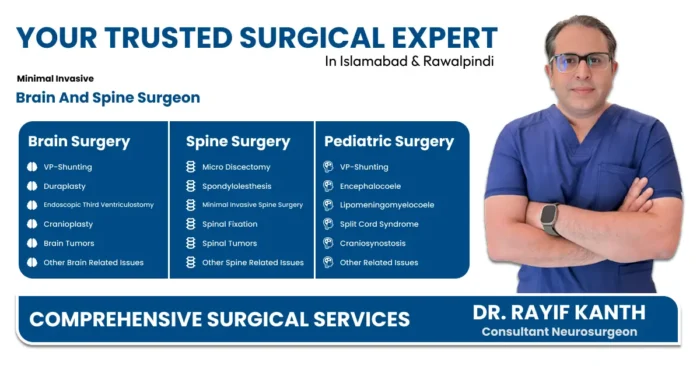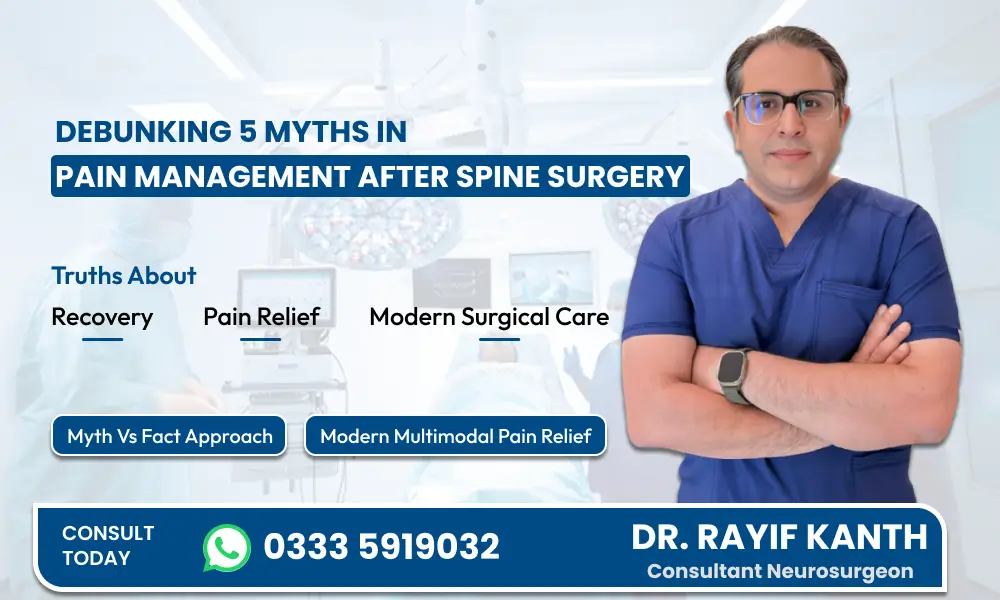Introduction: Understanding Pain Management After Spine Surgery
Surgical interventions for disc prolapse (also known as herniated disc) and spinal instability, such as discectomy, spinal fusion, or stabilization procedures, aim to alleviate nerve compression, restore stability, and reduce chronic pain. However, postoperative pain management remains a critical aspect of recovery, often clouded by misconceptions that can lead to suboptimal care, prolonged discomfort, or unnecessary anxiety.
These myths stem from outdated practices, anecdotal experiences, and a lack of awareness about modern multimodal pain management strategies. In this comprehensive guide, we’ll explore five prevalent myths and the evidence-based facts to help patients and caregivers navigate spine surgery recovery more effectively.
Myth 1: Bed Rest Is the Best Way to Manage Postoperative Pain After Spine Surgery
The Misconception
Many patients believe that extended bed rest minimizes pain and promotes healing after spine surgery for disc prolapse or spinal instability. This notion persists despite evidence showing otherwise.
The Evidence-Based Truth
In reality, prolonged bed rest is counterproductive for both acute and chronic low back pain, including post-surgical scenarios for disc prolapse. Patients are encouraged to remain active as tolerated, with early mobilization protocols often starting the same day as surgery to prevent complications like:
- Muscle atrophy
- Blood clots (deep vein thrombosis)
- Delayed recovery
- Increased pain perception
For spinal instability cases, enhanced recovery after surgery (ERAS) pathways emphasize walking and light activity, which can actually reduce pain intensity and opioid needs by improving circulation and endorphin release. Prolonged immobility can exacerbate stiffness and psychological distress, making pain feel worse.
Key Takeaway: Early mobilization after spine surgery accelerates recovery and reduces postoperative pain.
Myth 2: Opioids Are the Only Effective Option for Controlling Severe Postoperative Pain
The Misconception
A common misconception is that strong opioids for spine surgery pain are indispensable and the sole reliable method for managing intense pain following procedures like lumbar fusion for spinal instability.
The Evidence-Based Truth
While opioids play a role in acute pain control after spine surgery, over-reliance can lead to side effects such as:
- Constipation
- Nausea and vomiting
- Respiratory depression
- Higher risk of dependency—especially in patients with pre-existing chronic pain from disc prolapse
The fact is that multimodal analgesia provides superior outcomes. This approach combines:
- Non-opioid medications (e.g., acetaminophen, gabapentinoids)
- Infusion therapies (ketamine or lidocaine infusions)
- Regional pain management techniques (e.g., epidural blocks, nerve blocks)
This combination significantly reduces opioid consumption while providing better pain relief. For instance, ketamine infusions have been shown to lower pain scores and opioid use in the first 72 hours post-surgery, particularly for opioid-tolerant patients.
Key Takeaway: Multimodal pain management reduces opioid dependency while improving pain control after spine surgery.

Expert Neurosurgical Care When Every Minute Matters
Advanced, minimally invasive brain and spine treatment by Pakistan’s leading neurosurgeon
Schedule a consultation with Dr. Rayif Kanth 📞 0333 5919 032
Myth 3: NSAIDs Should Always Be Avoided After Spine Surgery Due to Risks to Bone Healing
The Misconception
Patients often hear that nonsteroidal anti-inflammatory drugs (NSAIDs) like ibuprofen must be strictly avoided post-surgery because they hinder bone fusion, a concern amplified in spinal fusion surgery cases requiring fusion.
The Evidence-Based Truth
This myth originates from animal studies, but human evidence indicates that any impact is dose- and duration-dependent, and short-term NSAID use is generally safe and beneficial. NSAIDs offer significant opioid-sparing effects, lowering pain scores after lumbar procedures for disc prolapse without compromising outcomes when used judiciously.
- Benefits of NSAIDs after spine surgery:Reduced inflammation and pain
- Lower opioid requirements
- Improved patient comfort
- Minimal impact on fusion rates with short-term use
Preoperative discussions with surgeons can help tailor their inclusion in personalized pain management plans.
Key Takeaway: Short-term NSAID use after spine surgery is safe and effective for pain control.
Myth 4: Any Postoperative Pain Means the Surgery Was Unsuccessful
The Misconception
It’s a widespread fear that lingering pain after surgery for disc prolapse or spinal instability signals a failed procedure or complications.
The Evidence-Based Truth
Some discomfort is normal during the healing process, as tissues recover from inflammation and surgical trauma. Advances in minimally invasive spine surgery have reduced this, but complete pain elimination isn’t always immediate or guaranteed.
- Important facts about post-surgical pain:Surgery addresses the root cause, like nerve compression
- Residual pain from muscle spasms or scar tissue may require ongoing management
- Healing timelines vary by individual and procedure type
- Chronic postsurgical pain can occur in high-risk patients
Setting realistic expectations preoperatively, including potential for chronic postsurgical pain in high-risk patients, helps mitigate anxiety and disappointment.
Key Takeaway: Some postoperative pain is normal and doesn’t indicate surgical failure.
Myth 5: Recovery from Spine Surgery Is Always Extremely Painful and Lengthy
The Misconception
The idea that spine surgery recovery involves months of debilitating pain and disability deters many patients from necessary procedures.
The Evidence-Based Truth
Contrary to this belief, modern neurosurgical approaches have revolutionized recovery timelines:
- Microdiscectomy for disc prolapse: Most patients return to normal activities within 2-8 weeks
- Early ambulation protocols: Minimize downtime and accelerate healing
- Outpatient spine surgery options: Reduce hospital stays and healthcare costs
For spinal instability, fusion surgeries have evolved with better pain control through ERAS protocols, leading to:
- Shorter hospital stays
- Less intense pain compared to traditional approaches
- Faster return to daily activities
Factors influencing recovery success:
- Patient age and overall health
- Preoperative health optimization
- Adherence to physical therapy
- Smoking cessation
- Proper nutrition and weight management
Success rates are high when patient expectations align with evidence-based outcomes.
Key Takeaway: Modern spine surgery offers faster, less painful recovery than many patients expect.

Conclusion: Evidence-Based Pain Management for Optimal Spine Surgery Recovery
Effective pain management for surgical patients with disc prolapse and spinal instability relies on debunking these myths through education and personalized, evidence-based strategies.
Best Practices for Postoperative Pain Management:
- Early mobilization instead of prolonged bed rest
- Multimodal analgesia to minimize opioid dependence
- Judicious NSAID use for inflammation control
- Realistic expectations about healing timelines
- Multidisciplinary care approach involving surgeons, pain specialists, and physical therapists
By embracing multimodal pain management approaches and early activity, patients can achieve better pain control and quality of life after spine surgery.
Take Action
Consult with a multidisciplinary team—including spine surgeons, pain management specialists, and physical therapists—to ensure optimal recovery. Always discuss individual concerns with your healthcare provider for tailored advice specific to your condition and surgical procedure.

Expert Neurosurgical Care When Every Minute Matters
Advanced, minimally invasive brain and spine treatment by Pakistan’s leading neurosurgeon
Schedule a consultation with Dr. Rayif Kanth 📞 0333 5919 032
